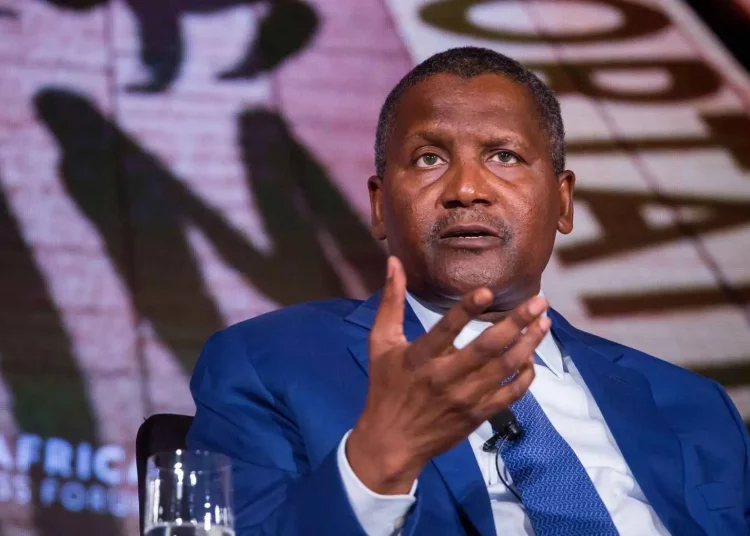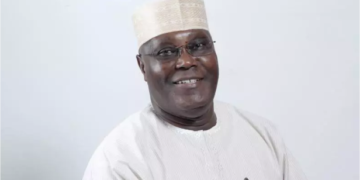The president of Dangote Group, Aliko Dangote, has urged the federal government and petroleum regulatory authorities to take decisive action against refinery licence holders who fail to proceed with project development.
Speaking at the ongoing Global Commodity Insights Conference on the West African Refined Fuel Market in Abuja on Tuesday, Dangote emphasised the need for Nigeria to move from dependence on imported refined petroleum products to full self-sufficiency and industrial transformation.
Dangote also lamented that Africa loses $90 billion annually to imported substandard fuel, with the continent increasingly becoming a destination for cheap, often toxic petroleum products, many of which are blended to substandard levels that would not be permitted in Europe or North America.
Dangote, whose group has led sweeping industrial expansion across Nigeria and Africa, especially constructing and operationalising the 650,000 barrels per day Dangote Refinery, pointedly called on both regulators and private sector players to ensure that those issued refinery licences but had not commenced building must either be compelled to proceed or face penalties, including the revocation of their licences.
“Others should be encouraged to build refineries if they are serious. I think encouraging other people to build refineries is the job of the NMDPRA and also the government. Engr Farouk, I will rely on your leadership to encourage those who have collected licences but are not building. And I believe anybody who collected these licences from you, either you cancel them or you put a penalty on a yearly basis so that they will return the licence or they will build those refineries,” Dangote charged.
Engr Farouk Ahmed is the chief executive officer of the Nigerian Midstream and Downstream Petroleum Regulatory Authority (NMDPRA).
Dangote highlighted Nigeria’s progress in cement, fertiliser, and petroleum sectors, noting that his company alone had achieved over 52 million tonnes in cement capacity, with plans to surpass 60 million tonnes soon and aiming for $500 million in cement and clinker exports by 2027.
He further celebrated Nigeria’s emergence as a net exporter of various commodities, including petroleum products and fertilsers.
Dangote warned against the dangers of allowing dumping to undermine Nigeria’s manufacturing base and stressed local value addition as the path to prosperity. He urged that Africa should refine all petroleum products it consumes within the continent.
With the Dangote refinery set to be listed publicly, he invited more Nigerians and African partners to participate in the sector’s growth story.
“The road to industrial self-reliance is not easy. It is full of obstacles – technical, financial, commercial, and political – but the rewards are even greater: jobs, value retention, and economic transformation. Let us refine it, transform it, and use it to power the next chapter of Africa’s development,” he said.
Africa imports $90bn worth of fuel yearly
Dangote lamented that due to the continent’s limited domestic refining capacity, Africa imports over 120 million tonnes of refined petroleum products annually, at a cost of approximately $90 billion.
While appreciating the management of the Nigerian National Petroleum Company Limited (NNPC) for making some cargoes of Nigerian crude available to his refinery from the start of production to date, even as he revealed that his company imports between 9-10 million barrels of crude monthly from the United States of America and other countries.
In his speech, NMDPRA CEO Farouk Ahmed noted that despite being a significant producer of hydrocarbon resources, an important consumer of refined petroleum products and a growing refining hub, West Africa continues to depend on posted prices of global reference markets such as Northwest Europe (NWE), US Gulf Coast, Mediterranean, Singapore, and Arab Gulf for all its trading activities.
He explained that while these benchmarks are globally accepted, often they do not reflect the unique supply chain peculiarities, market dynamics, and economic realities of the African continent.
“A regional pricing benchmark that promotes price discovery, transparency, deepened market development, and enhanced availability of energy has then become a strategic objective that requires the collaborative action of all the stakeholders that are major players in this market.
“Establishing a regional pricing reference point would facilitate: growth of trading of petroleum products in the region; establishment of additional storage and supply infrastructure to accommodate the growing volumes of trading activities, and real-time pricing data that is reflective of the peculiarities of the West African market fundamentals,” he said.
Ahmed noted that the regional supply of fuels in West Africa had grown through improved refining capacities in Nigeria, Ghana, Niger, Senegal and Cote D’Ivoire, which currently stands at 1.335 million barrels per day.
“Our 2025 statistical data for fuel supply in the West African region reveals that 2.05 million MT per month of gasoline is being traded, consisting of 1.44 million MT (69 per cent) imports and 0.61 million MT (31 per cent) refinery contribution from the region.”
Changes to NMDPRA, NUPRC Boards Weakens Investor-confidence
Chairman of the House Committee on Petroleum Resources (Downstream), Hon Ikenga Ugochinyere cautioned against attempts to dissolve the boards of the NMDPRA and the Nigerian Upstream Petroleum Regulatory Commission (NUPRC), saying such moves threaten investor confidence and undermine the Petroleum Industry Act (PIA).
Ugochinyere described the NMDPRA and NUPRC as products of years of legislative advocacy and reforms, stating that arbitrary leadership changes would send negative signals to investors.
“A regulator is not appointed to be liked but to lead with focus and integrity. Arbitrary dissolution in the middle of tenure sets a dangerous precedent and repels investors,” he said.
The lawmaker praised NMDPRA’s achievements, including attracting $1.2 billion in modular refinery investments, reducing fuel smuggling by 35 per cent, rolling out an Automated Downstream System (ADS), and boosting compressed natural gas conversion capacity.
African refiners need protection
Meanwhile, the Dangote Group president has called on African governments to follow the example of the United States, Canada, and the European Union, which have implemented protective measures for domestic refiners.
He decried the growing influx of discounted, low-quality fuel originating from Russia, blended with Russian crude under price caps and dumped in African markets.
Reflecting on the experience of delivering the world’s largest single-train refinery, Dangote also highlighted a range of challenges faced, including technical, commercial, and contextual hurdles unique to the African landscape.
He described building refineries such as the Dangote Petroleum Refinery as one of the most capital-intensive and logistically complex industrial facilities ever constructed.
He added that, in terms of port charges, it is currently more expensive to load a domestic cargo of petroleum products from the Dangote Refinery, as customers pay both at the point of loading and at the point of discharge.
Dangote further criticised the lack of harmonised fuel standards across African nations, which creates artificial barriers for regional trade in refined products.
He revealed that despite producing around seven million barrels of crude oil per day, Africa only refines about 40 per cent of its 4.3 million barrels’ daily consumption of refined products domestically. In stark contrast, Europe and Asia refine over 95 per cent of what they consume.
While reaffirming his belief in the power of free markets and international cooperation, Dangote emphasised that trade must be grounded in economic efficiency and comparative advantage, not at the expense of quality or safety standards.
“It defies logic and economic sense for Africa to be exporting raw crude only to re-import refined products, products we are more than capable of producing ourselves, closer to both source and consumption,” he argued.





